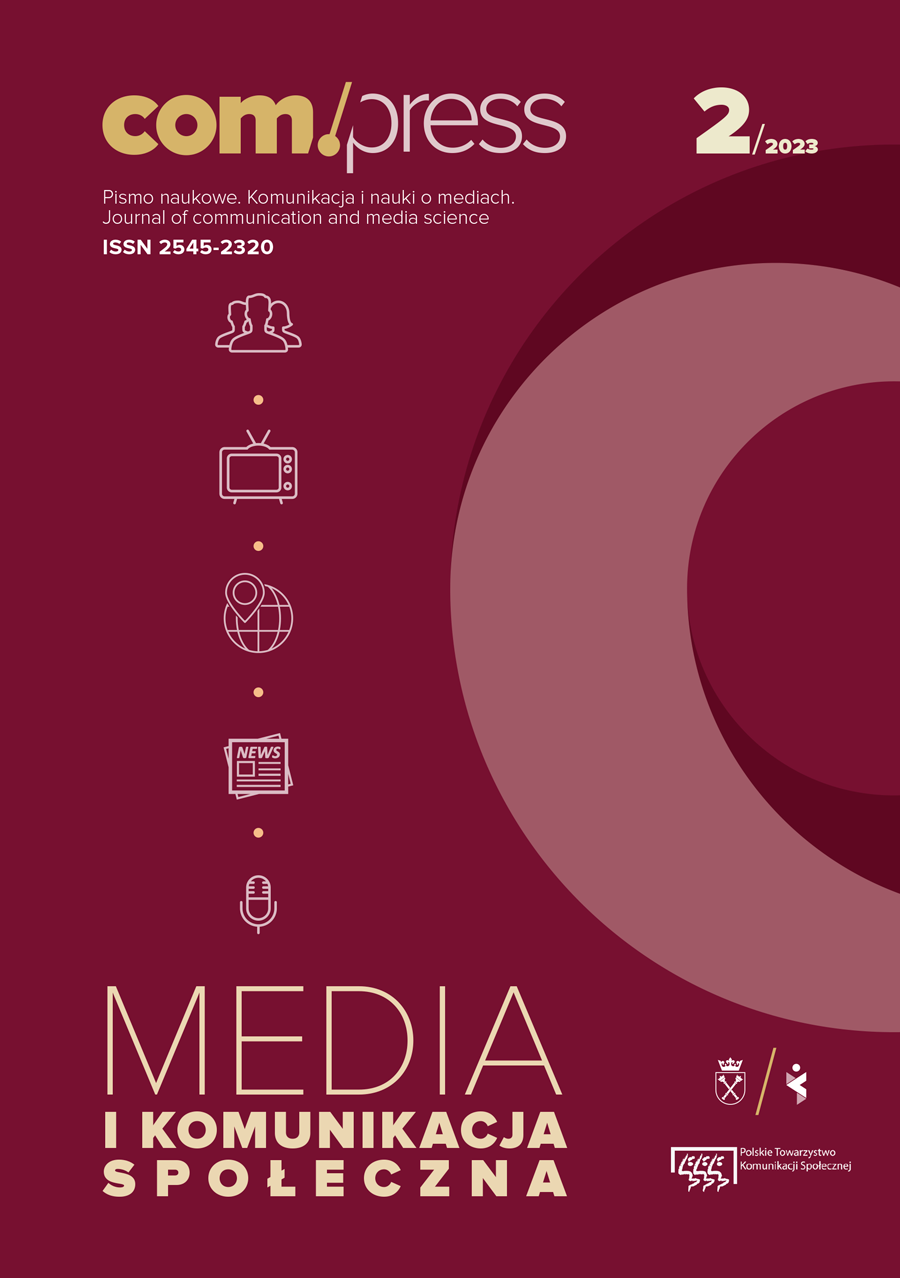Sexualisation in the Media on the Example of Selected Versions of Programme “Naked Attraction”
DOI:
https://doi.org/10.51480/compress.2023.6-2.606Keywords:
sex, sexualisation, media, Naked Attraction, nudityAbstract
The emergence of artificial intelligence and new media, as well as technological changes, have prompted many changes in the media defined as traditional. Television producers are constantly looking for new forms in order to keep up with modern audiences and their demands. Some of these are very controversial and have to do with moral or ethical questions. A programme that has been described by Angela Smith as “the last taboo in mainstream television” is the show “Naked Attraction”. Its participants select a date partner from among naked people. The aim of the study, which involved qualitative and quantitative content analysis, was to examine how nudity is portrayed and described in selected editions of the show. The episodes of the show broadcast in different countries – Poland, the UK, Finland and Denmark – were examined and compared. The aim was to find out what characterises the show’s participants, how they and the hosts express themselves about sex and nudity, and what the participants’ (stated) attitudes are towards taking part in the programme.
References
Antosik, M. (2014). Człowiek współczesny w obliczu manipulacji. Warmińsko‑Mazurski Kwartalnik Naukowy, 39–49.
Aronson, E., Wilson, T.D., Akert, R.M. (1997). Psychologia społeczna. Serce i umysł. Poznań: Zysk i S-ka.
Attwood, F. (2009). Introduction: The Sexualization of Culture. W: Attwood, F. (red.), Mainstreaming sex. The sexualisation of Wester Culture. New York: I.B. Tauris.
Attwood, F. (2018). Sex Media. Cambridge, UK: Polity Press.
Coy, M. (2013). Children, Childhood and Sexualised Popular Culture. W: Wild, J. (red.), Exploiting Childhood: How Fast Food, Material Obsession and Porn Culture are Creating New Forms of Child Abuse. London and Philadelphia: Jessica Kingsley Publishers.
Coy, M. (2014). Sexualised sexism: popular culture, sexualisation and violence against women and girls. Discussion Paper. London Metropolitan University, London. Pobrane z: https://repository.londonmet.ac.uk/5806/1/EVAW%20sexualisation%20briefing%20FINAL.pdf (15.01.2023).
Coy, M., Garner, M. (2012). Definitions, discourses and dilemmas: policy and academic engagement with the sexualisation of popular culture, Gender and Education, 24, 285–301.
Denby, A. (2021). Toxicity and Femininity in Love Island: How Reality Dating Shows Perpetuate Sexist Attitudes Towards Women, Frontiers in Sociology, https://doi.org/10.3389/fsoc.2021.641216.
Flak, Ł. (2020). Nadprodukcja talentów w formatach na przykładzie muzycznych talent show. Zarządzanie Mediami, 8 (3), 277–302. doi:10.4467/23540214ZM.20.036.12054.
Frequently Asked Questions. (2023). Pobrane z: https://www.channel4.com/corporate/about-4/operating-responsibly/freedom-information/frequently-asked-questions (15.10.2023).
Gill, R. (2007). Postfeminist media culture: elements of a sensibility. European Journal of Cultural Studies, 10 (2), 147–166.
Gill, R. (2012). Media, empowerment and the ‚sexualization of culture’ debates. Sex Roles: A Journal of Research, 66 (11–12), 736–745. https://doi.org/10.1007/s11199-011-0107-1.
Gryżewski, A. (2020). „Gangsterzy – tacy jak Massimo – to osobowości psychopatyczne, chcą niszczyć, kraść, a nie kochać”. Wywiad z Olą Długołęcką. Pobrane z: https://weekend.gazeta.pl/weekend/7,177333,25691894,gangsterzy-tacy-jak-massimo-to-osobowosci-psychopatyczne.html (20.01.2023).
Hamer, H. (2005). Psychologia społeczna – teoria i praktyka. Warszawa: Difin.
Kozłowska, A. (2006). Oddziaływanie mass mediów, Warszawa: Szkoła Główna Handlowa w Warszawie – Oficyna Wydawnicza.
Matthews, J., Nairn, A. (2020). Lights, Action, Naughty Bits: A Thematic Analysis of New Zealanders’ Attitudes to Naked Attraction. IAFOR Journal of Cultural Studies, 5.
McNair, B. (2004). Seks, demokratyzacja pożądania i media, czyli kultura obnażania. Warszawa: Muza.
McQuail, D. (2007). Teoria Komunikowania Masowego, Warszawa: Wydawnictwo Naukowe PWN.
Meller, K. (2021). Premiera „Magii nagości. Polska” wstrzymana po skargach do KRRiT. Pobrane z: https://teleshow.wp.pl/premiera-magii-nagosci-polska-wstrzymana-po-skargach-do-krrit-6638072023460352a (21.01.2023).
Niedbalski, M. (2023). W Zoom TV nie będzie wiosną nowych odcinków „Magii nagości. Polska”. Pobrane z: https://www.press.pl/tresc/74806,w-zoom-tv-nie-bedzie-wiosna-nowych-odcinkow-_magii-nagosci_-polska_ (23.01.2023).
O nas. (2023). Pobrane z: https://zoomtv.pl/o-nas (17.10.2023).
Papadopoulos, L. (2010). Sexualisation of young people review. London: Home Office.
Piontek, D. (2003). Z telenowelą do Unii Europejskiej. Studia Medioznawcze, 5 (15), 156–172.
Piontek, D. (2011). Komunikowanie polityczne i kultura popularna. Tabloidyzacja informacji o polityce, Poznań: Wydawnictwo Naukowe WNPiD UAM.
Pokorna‑Ignatowicz, K. (2012). O prorodzinnej misji TVP uwag kilka, czyli telenowele a kapitał społeczny. W: Pokorna‑Ignatowicz, K. (red.), Medialny obraz rodziny i płci. Kraków: Oficyna Wydawnicza AFM.
Smith, A. (2019). ‘How the hell did this get on tv?’: Naked dating shows as the final tabooon mainstream TV. European Journal of Cultural Studies, 22 (5–6), 700–717.
The 2022 Year in Review. (2022). Pobrane z: https://www.pornhub.com/insights/2022-year-in-review (26.01.2023).
Wylie, K. (2009). A Global Survey of Sexual Behaviours. Journal of Family and Reproductive Health, 3, 39–49.
Zurbriggen, L.E., Collins, R.L., Lamb, S., Roberts, T., Tolman, D.L., Ward, L.M., Black, J. (2007). Report of the APA Task Force on the Sexualization of Girls. Pobrane z: https://www.apa.org/pi/women/programs/girls/report-full.pdf (21.01.2023).
Downloads
Published
How to Cite
Issue
Section
License
Copyright (c) 2024 Polish Communication Association

This work is licensed under a Creative Commons Attribution-ShareAlike 4.0 International License.
Content of the articles is licensed under a Creative Commons Attribution 4.0 International license





